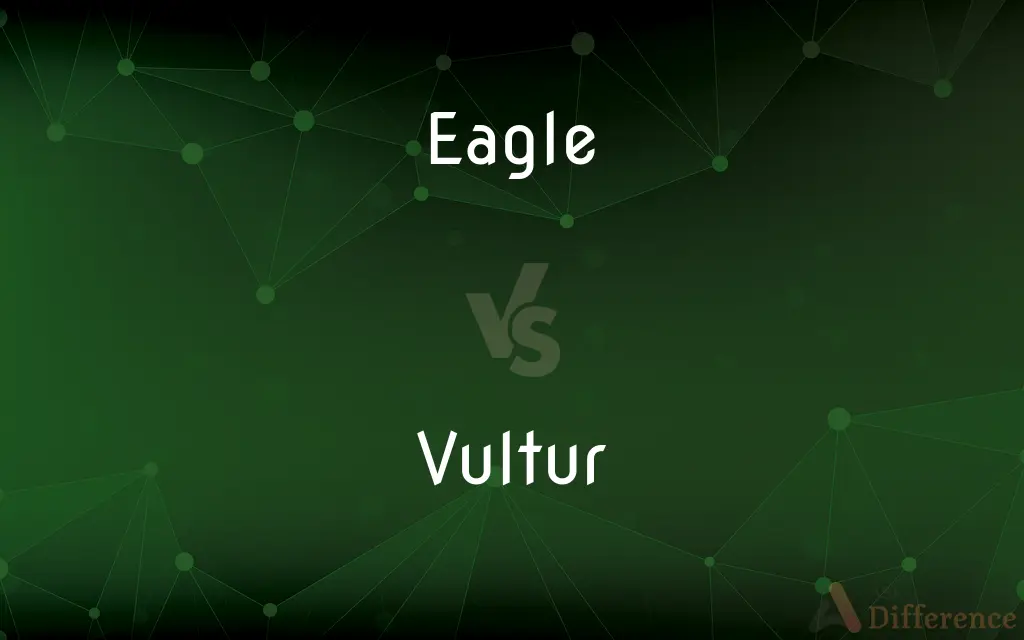Eagle vs. Vultur — What's the Difference?
By Tayyaba Rehman — Published on November 14, 2023
Eagles are birds of prey known for their sharp vision and powerful flight. Vultures are scavengers, often bald, feeding mostly on carcasses.

Difference Between Eagle and Vultur
Table of Contents
ADVERTISEMENT
Key Differences
Eagles represent a variety of large hunting birds characterized by a sharp beak and large wingspan. Conversely, Vultures, or Vultur, are not hunters but scavengers, relying on the dead animals for sustenance, exhibiting a sharp sense of smell to locate their food.
Eagle species are revered for their majestic appearance and are often symbols of freedom, authority, and victory. Vultur, however, due to their scavenging nature, are frequently associated with death and rebirth, often perceived negatively in various cultures.
Eagles are known for building their nests, called eyries, on high cliffs or trees. Vultures, in contrast, do not build elaborate nests; they lay their eggs in bare, minimal spaces, often on cliff ledges or in hollow trees, showcasing less territorial behavior than Eagles.
An Eagle’s diet consists primarily of small mammals, fish, or birds. In sharp contrast, a Vultur’s diet is mainly carcasses, contributing significantly to the ecosystem by disposing of decaying bodies, preventing the spread of disease.
Eagles have strong talons they use to catch prey, and they're known for their incredible vision, which aids in hunting. Vultures, however, have relatively weak feet and don't need the keen eyesight of eagles, as they're not actively hunting live prey, but rather use their keen sense of smell to locate food.
ADVERTISEMENT
Comparison Chart
Diet
Predatory
Scavenging
Cultural Symbol
Freedom, power
Death, rebirth
Nesting
High cliffs, trees
Bare spaces, ledges
Feeding Habits
Hunts live prey
Feeds on carcasses
Physical Traits
Sharp vision, talons
Strong smell, bald
Compare with Definitions
Eagle
A large bird of prey with a massive hooked bill and long, broad wings.
The eagle soared majestically over the towering mountains.
Vultur
A person who preys on others, akin to a scavenger.
He was a vultur in business, capitalizing on the misfortunes of his competitors.
Eagle
An insightful person with a broad perspective.
She's the eagle of our team, always forecasting trends way ahead of time.
Vultur
An emblem of cleaning and renewal due to its scavenging habits.
In some cultures, the vultur is a symbol of purification and the cycle of life and death.
Eagle
A golf term denoting two under par.
He scored an eagle on the 5th hole, eliciting cheers from the crowd.
Vultur
A large scavenging bird, often bald-headed, that feeds primarily on carcasses.
The vultur circled above, waiting to descend on the deserted carcass.
Eagle
Any of various large diurnal birds of prey of the family Accipitridae, including members of the genera Aquila and Haliaeetus, characterized by broad wings, a hooked bill, keen vision, and soaring flight.
Vultur
A guardian or protector in certain mythologies, associated with deities of war and death.
The deity, depicted with a vultur's head, was revered and feared in equal measure.
Eagle
A representation of an eagle used as an emblem or insignia.
Vultur
An indication of sharp instinct, especially toward opportunities.
Her vultur-like instincts led her straight to the hidden treasure.
Eagle
A gold coin formerly used in the United States, stamped with an eagle on the reverse side and having a face value of ten dollars.
Vultur
Usually restricted to the Andean condor
Eagle
(Sports) A golf score of two strokes under par on a hole.
Eagle
To shoot (a hole in golf) in two strokes under par.
Eagle
To score an eagle in golf.
Eagle
Any of several large carnivorous and carrion-eating birds in the family Accipitridae, having a powerful hooked bill and keen vision.
Eagle
A gold coin with a face value of ten dollars, formerly used in the United States.
Eagle
A 13th-century coin minted in Europe and circulated in England as a debased sterling silver penny, outlawed under Edward I of England.
Eagle
(golf) A score of two under par for a hole.
Eagle
(golf) To score an eagle.
Eagle
Any large, rapacious bird of the Falcon family, esp. of the genera Aquila and Haliæetus. The eagle is remarkable for strength, size, graceful figure, keenness of vision, and extraordinary flight. The most noted species are the golden eagle (Aquila chrysaëtus); the imperial eagle of Europe (Aquila mogilnik or Aquila imperialis); the American bald eagle (Haliæetus leucocephalus); the European sea eagle (Haliæetus albicilla); and the great harpy eagle (Thrasaetus harpyia). The figure of the eagle, as the king of birds, is commonly used as an heraldic emblem, and also for standards and emblematic devices. See Bald eagle, Harpy, and Golden eagle.
Eagle
A gold coin of the United States, of the value of ten dollars.
Eagle
A northern constellation, containing Altair, a star of the first magnitude. See Aquila.
Eagle
The figure of an eagle borne as an emblem on the standard of the ancient Romans, or so used upon the seal or standard of any people.
Though the Roman eagle shadow thee.
Eagle
Any of various large keen-sighted diurnal birds of prey noted for their broad wings and strong soaring flight
Eagle
(golf) a score of two strokes under par on a hole
Eagle
A former gold coin in the United States worth 10 dollars
Eagle
An emblem representing power;
The Roman eagle
Eagle
Shoot in two strokes under par
Eagle
A representation of freedom and strength.
The bald eagle is a symbol of America, representing enduring freedom.
Eagle
A distinguished figure or symbol of authority and victory.
The company's logo, an eagle, signified its dominance over the industry.
Common Curiosities
Are eagles and vultures both considered birds of prey?
Eagles are birds of prey; vultures, though similar, are scavengers and not classified as birds of prey.
How do the nesting habits of eagles and vultures differ?
Eagles build nests on high elevations; vultures lay eggs in minimal spaces, not constructing actual nests.
Do both eagles and vultures have a similar diet?
No, eagles hunt live prey, while vultures feed primarily on carcasses.
Are vultures also referred to as "vultur"?
Yes, "vultur" is a scientific term often used for vultures, particularly in species' Latin names.
Why are eagles often seen as symbols of freedom?
Eagles are associated with freedom due to their ability to fly high and their dominant predator status.
Are all eagles carnivorous?
Yes, all eagles are carnivorous and feed on a diet of meat from various creatures.
Do vultures have any natural predators?
Adult vultures have few natural predators due to their size and nature, but their eggs and young can be vulnerable.
What primarily differentiates an eagle from a vultur?
Eagles are hunters with sharp vision, while vultures are scavengers with a keen sense of smell.
Are eagles solitary or social birds?
Eagles are generally solitary, especially when hunting, though they may pair for life.
What ecological role do vultures play?
Vultures help maintain ecological balance by consuming dead animals, preventing the spread of disease.
Is the term "eagle-eyed" related to the bird's vision?
Yes, "eagle-eyed" refers to the sharp vision of eagles, implying an ability to see or observe with exceptional clarity.
What's the significance of baldness in many vulture species?
Baldness helps vultures keep clean, as feeding on carcasses can be a messy endeavor.
How do vultures locate their food?
Vultures use their keen sense of smell and sight to locate carcasses from great distances.
Can eagles see farther than humans?
Yes, eagles have incredibly keen eyesight, estimated to be 4-8 times stronger than that of the average human.
What type of habitats do vultures prefer?
Vultures are versatile and can inhabit diverse environments, though they prefer open areas for easy carcass detection.
Share Your Discovery

Previous Comparison
Inflectional Morphology vs. Derivational Morphology
Next Comparison
U Shaped Valley vs. V Shaped ValleyAuthor Spotlight
Written by
Tayyaba RehmanTayyaba Rehman is a distinguished writer, currently serving as a primary contributor to askdifference.com. As a researcher in semantics and etymology, Tayyaba's passion for the complexity of languages and their distinctions has found a perfect home on the platform. Tayyaba delves into the intricacies of language, distinguishing between commonly confused words and phrases, thereby providing clarity for readers worldwide.














































